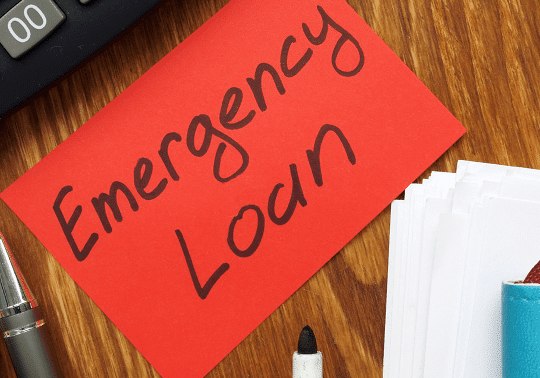






Best Personal Loans in 2025
Millions of Americans use personal loans every year to consolidate debt, pay for unexpected expenses, renovate their homes, and more. People find personal loans attractive as they have lower interest rates and smaller loan amounts than other types of loans, making them appealing to consumers with fair to excellent credit.
Applying for a personal loan is fast and easy:
Compare personal loan rates
Compare personal loan rates in July, 2025
Need help finding the right loan?
No worries, we've got you covered! Compare personalized loan options in just minutes.
How Pasha Funding Works

Compare personal loan rates
What is a personal loan?
A personal loan is a financial tool that provides individuals with the flexibility to borrow money for various purposes. Unlike loans that are specifically designated for a particular use (e.g., a mortgage for buying a home or an auto loan for purchasing a car), a personal loan allows borrowers to utilize the funds for a wide range of personal needs. It could be used for consolidating debts, covering unexpected expenses, financing home improvements, or even taking a dream vacation.
What sets personal loans apart is their unsecured nature, meaning they typically don't require collateral. Instead, lenders assess borrowers based on their creditworthiness, income, and other financial factors to determine eligibility and interest rates. Personal loans offer fixed monthly payments and set repayment periods, allowing borrowers to plan their finances accordingly.
Personal loans are available from various providers, including traditional banks and online lenders. They work with borrowers who have a variety of credit scores, income levels, and other criteria.
How does a personal loan work?
Personal loans are a kind of installment loan. This means you take out a loan for a specific amount of money and pay it back in monthly installments with interest during the loan's term, which is typically 12 to 84 months. Once you have paid off your loan in full, your account will be canceled. You must apply for a new loan if you require additional funds.
The loan amounts differ depending on the lender, but they often range from $1,500 to $100,000. Your credit score determines the amount you are eligible for or how confident creditors are in your capacity to repay them if you borrow money.
A personal loan's approval process can be quick. In some cases, it can get completed in as little as a week. Soon after getting your funds, you'll begin paying monthly loan payments.
It's critical to consider why you require funds and select the most appropriate loan type based on your current financial condition.
Estimate your personal loan payments
Total Payment
-
Total Interest
-
Monthly Payment
-
Ready to apply for a personal loan?
Compare rates from top lenders with no impact on your credit, ever.
What are personal loans used for?
Personal loans, also known as signature loans, debt consolidation loans, or unsecured loans, allow you to use them in various ways.
Most lenders give you a lot of flexibility in how you spend your personal loan funds. Examples include:
- Debt consolidation
- Home renovations and repairs
- Medical emergencies or bills
- Repaying family or friends
- Divorce costs
- Wedding expenses
- Vacations
- Funeral costs
- Moving expenses
- Holiday shopping
- Appliance or furniture purchases
- Auto loans
- Recreation
- Education
- Student debt
- Unexpected costs
- You don't have any credit history and want to build your credit score.
- You have a bad credit score and want to improve your score
Keep in mind that some lenders may enforce limitations on how you might use your funds. Some states, for example, may make it illegal to spend money on education. Ensure you can use a personal loan for your intended purpose by checking with the lender ahead of time.
Quick links

Ready to find the best personal loan? Getting started just takes minutes.
Pros & cons of personal loans
Pros:
Under the right circumstances, personal loans can be highly beneficial.
- Monthly payments and fixed rates: Personal loans include fixed interest rates and monthly payments for a specified period, so you always know how much you owe and for how long. Other financing options, such as home equity lines of credit, have variable rates, which might cause monthly payments to fluctuate.
- Loan amounts are flexible: You may be eligible for personal loans ranging from $1,000 to $100,000, depending on your creditworthiness and the lender. This range covers several expenses, from minor mishaps to major house improvements.
- APRs start out lower than credit cards: Personal loans typically have lower annual percentage rates (APRs) than credit cards for consumers with good credit. While some credit cards offer 0% interest for a limited time, the rates are usually higher once the promotional period ends.
- No collateral: Unlike home equity loans, which require you to put your house up as security, unsecured personal loans do not. If you can't pay back the loan, you risk harming your credit, but you won't lose any assets.
- Helps you build credit: You must make monthly payments toward the outstanding sum when you take out a personal loan. Making regular on-time payments will help you improve your credit score. This also implies that if you make late payments or default on a loan, your credit score will suffer, making it harder to obtain credit in the future.
Cons
Personal loans can be a terrific method to pay expenses, but they also have some risks and disadvantages.
- Fees: Borrowers may be required to pay fees in addition to their loan payments, such as origination or late fees.
- Increases your debt: Taking out a personal loan increases your debt, so make sure you account for it and are confident in your ability to repay it.
- Maximum APRs can be high: Personal loan APRs can be higher than credit card APRs if you have a bad credit score.
- Lowers your credit score: Borrowers who fail to make timely payments or default on the loan entirely will likely have their credit score lowered.
- Requires collateral: If your credit score isn't high enough to qualify for a secured loan, you might need to put up assets as collateral. If you default on a secured personal loan, the lender has the right to keep the collateral. A borrower's home, boat, car, or certificate of deposit (CD) are examples of common collateral.
How do I qualify for a personal loan?
It's not necessarily the case that just because you fulfill a lender's minimum credit score requirements, you'll be approved for a loan.
Lenders evaluate an application based on several factors. Alternative data, such as where you went to college and what industry you work in, is used by some. Others are primarily interested in your credit report and history, as well as your income and debts.
On a personal loan application, most lenders look for the following:
- Your credit score
- Your incomes
- Your payment history
- Your collateral if you apply for a secured loan
- Your debt-to-income ratio
- Your free cash flow (how much you are left with after paying for your expenses)
If your credit and income status aren't where you'd like them to be for a personal loan, work on improving them before applying.
Start by reviewing your credit report to see whether there are issues, and then concentrate on paying off debt to lower your debt-to-income ratio. This can be a lengthy process, but it can help you qualify for a reduced interest rate and help you save a lot of money.
What credit score do I need to apply for a personal loan?
A credit score is a number that gets calculated from the information in your credit reports. The majority of credit scores fall between 300 and 850, and where your score falls within this range indicates your potential credit risk. Simply put, it tells potential lenders how likely you are to repay a loan.
Your credit scores may influence whether or not you are approved for any form of credit. Your credit scores can also influence the terms and loan rate you're provided if you're approved.
Personal loan credit score requirements differ depending on the lender. Many lenders prefer applicants with good or excellent credit (690 FICO or higher). However, some will accept borrowers with terrible credit (below 630). A credit score of 610 to 640 is usually required to qualify for a personal loan.
The FICO score ranges are as follows:
| <580 | Poor | Your score is significantly lower than the national average, indicating that you are a high-risk borrower to lenders. |
| 580-669 | Fair | Your score is lower than the national average, but many lenders will approve loans with this score. |
| 670-739 | Good | Your score is close to or somewhat higher than the national average, and most lenders consider this to be a good score. |
| 740-799 | Very Good | Your score is higher than the national average, indicating to lenders that you are a trustworthy borrower. |
| 800+ | Exceptional | Your score is significantly higher than the national average, indicating that you are an exceptional borrower to lenders. |
As part of your application process, the lender will check your credit. This is referred to as a hard inquiry, and it lowers your credit scores by a few points, remaining on your credit reports for around two years.
When you're looking for the best rates, some lenders with whom you already have an account will do a credit check on you. This is known as a soft inquiry, and it has no bearing on your credit scores. Check your rates with lenders who offer soft pulls, which don't affect your credit ratings.
You may get a free annual credit report from each of the three credit reporting agencies at AnnualCreditReport.com. Equifax, Experian, and TransUnion are among these agencies.
Are there alternatives to personal loans?
Personal loans can help you get the money you need in various circumstances, but they aren't always the greatest option. There are alternatives to personal loans, so do your research before making a decision.
- Credit cards: Personal loans can assist you in obtaining funds in various situations, but they are not always the best solution.
- Personal line of credit: A credit line that allows you to borrow up to a set amount on a rolling basis. Credit limits may be higher than with a credit card.
- 401(k) loan: Instead of borrowing money from a lender, you could take out a loan from your retirement account.
- Peer-to-peer loan: A loan that is not funded by a financial institution but rather by a group of investors.
- Salary advance: A contract with your employer allowing you to get part or all of your following paycheck in advance.
- Home equity loan (HEL) or home equity line of credit (HELOC): A home equity loan or line of credit allows you to borrow money against the value of your property.
- Small business loan: A type of financing that assists businesses in covering their day-to-day expenses.
- Overdraft: An overdraft allows you to go into debt with your bank, pay interest during that duration, then repay it at a later date.
- Title loan: Your car title is used as collateral for title loans. If you don't pay your loan back (usually within two to four weeks), the lender has the right to repossess your vehicle.
- Cash advance app: These apps allow you to borrow money instantly against your next paycheck, don't perform credit checks, and they don't charge interest. Loan amounts are smaller, ranging between $50 and $250.
How to choose the right personal loan for your needs
Because each lender's terms and conditions are different, you'll need to know what you're looking for in a personal loan before you start shopping around.
Checking that a lender is licensed in your state is an excellent place to start. Check to see if each lender can provide personal loans in your area. Then you may evaluate these other important aspects to assist you in selecting the best lender.
- Interest rates: Fixed and variable interest rates are available for personal loans. Most personal loans have a fixed interest rate that stays the same throughout the term of the loan. Depending on current interest rates, a variable rate changes over the loan period. Some borrowers prefer a fixed-rate loan over a variable-rate loan because they don't want the volatility of a variable-rate loan.
- Approval requirements: Lenders regularly establish minimum credit score requirements and other qualifying variables that borrowers must achieve to qualify for a personal loan. These include your employment status, your income, and your debt-to-income ratio.
- Loan terms: Each lender establishes its own terms, including loan amounts, term lengths, and loan use restrictions.
- Fees and penalties: The fees charged by each lender are one of the most significant things to compare before picking the ideal personal loan. Fees can significantly increase a personal loan's cost. Fees that you should compare include origination fees, late payment fees, returned payment fees, and prepayment penalties (which is when you pay off the loan before the term ends)
- Disbursement times: Lenders have their own timelines for when you might expect to get your personal loan funds. Some lenders provide quick funding options, such as a transfer the same day you're authorized. Others may send payments the next business day after receiving approval.
- Repayment options: Most lenders provide various payment choices, including autopay, mail-in checks, and the ability to adjust your payment date. Some lenders offer an autopay discount, which might lower your interest rate if you sign up.
- Customer service: Research what others say about the lender by checking online reviews. Look for negative remarks and complaints, so you know what to expect.
- Additional features: Some lenders offer additional features to make them attractive to borrowers. An example of an additional feature is unemployment protection plans.
Consider adding up all of the fees involved with the loan, not just the interest rate, to estimate the entire amount you'll be accountable for repaying before signing any contract.
Is a personal loan the best option for you?
Determining whether a personal loan is the best option for you depends on your unique financial circumstances and the specific needs you have. Here are a few factors to consider when evaluating whether a personal loan is the right choice:
- Purpose of the loan: Personal loans are versatile and can be used for various purposes. If you have a specific need, such as consolidating high-interest debts or funding a home improvement project, a personal loan can be a suitable option. However, if you have a more specialized need, like purchasing a car or financing education, there may be better loan options available, such as an auto loan or a student loan.
- Interest rates and terms: Personal loans can have competitive interest rates, particularly for individuals with good credit. However, it's essential to compare rates with other loan options to ensure you're getting the best deal. Additionally, consider the repayment terms and monthly payments to ensure they fit comfortably within your budget.
- Creditworthiness: Personal loans are available for individuals with various credit profiles, including fair or poor credit. However, keep in mind that the interest rates and loan terms offered may vary based on your creditworthiness. If you have excellent credit, you may qualify for more favorable terms and lower interest rates, potentially making a personal loan a more attractive option.
- Alternatives available: It's worth exploring other financing options before committing to a personal loan. For example, if you have a home with equity, a home equity loan or line of credit might offer lower interest rates. If you're looking to make a specific purchase, specialized loans like auto loans or student loans may be tailored to your needs.
- Financial goals and long-term impact: Consider how taking on a personal loan fits into your broader financial goals. Will it help you achieve your objectives, or could it hinder your financial progress? Evaluate the potential impact on your credit, monthly budget, and overall financial health before deciding if a personal loan is the best choice.
How to get a personal loan
Once you're ready to apply for a personal loan, follow these steps:
- Determine your loan purpose: Identify why you need the personal loan and how much money you require. This will help you determine the loan amount and terms that best suit your needs.
- Check your credit score: Obtain a copy of your credit report and review your credit score. Understanding your creditworthiness will give you an idea of the interest rates and loan options available to you. Ensure that your credit report is accurate and dispute any errors if necessary.
- Research lenders: Research and compare lenders to find the ones that offer personal loans that align with your requirements. Consider factors such as interest rates, fees, loan terms, and customer reviews to make an informed decision.
- Gather necessary documents: Collect the documents you'll need to complete the loan application. This typically includes identification documents (e.g., driver's license, passport), proof of income (pay stubs, tax returns), proof of residence, and any additional documents requested by the lender.
- Pre-qualify: Some lenders offer pre-qualification processes that allow you to check if you're likely to be approved for a loan without impacting your credit score. Pre-qualification gives you an idea of the loan amount and terms you may qualify for, helping you narrow down your options.
- Fill out the application: Complete the loan application form provided by the lender. Provide accurate and detailed information about your personal, financial, and employment details. Be prepared to disclose your income, expenses, existing debts, and the purpose of the loan.
- Submit the application: Submit your completed loan application, along with any supporting documents, to the lender. Ensure that all required information is included and that you've followed the instructions provided.
- Wait for approval: After submitting your application, the lender will review your information and make a decision. This process can take anywhere from a few hours to a few days, depending on the lender's procedures.
- Review and accept the loan offer: If approved, carefully review the loan offer, including the interest rate, repayment terms, fees, and any other conditions. Make sure you understand all the terms and ask questions if anything is unclear. If you're satisfied with the offer, accept it by following the lender's instructions.
- Receive funds: Once you've accepted the loan offer, the lender will typically transfer the funds directly to your bank account. The timing of the funds' availability can vary, so check with the lender for specific details.
Find Your Best Rate
Compare Best Personal Loans
Personal Loan Payoff Calculator
Personal Loan Lender Reviews
Personal Loans By Credit
Personal Loans for Fair Credit
Personal Loans for Good Credit
Personal Loans for Excellent Credit
Personal Loan Types
Auto Repair Loans
Credit Card Consolidation Loans
Fast Personal Loans
Home Improvement Loans
Horse Barn Financing
Wedding Loans
Family Planning Loans
Funeral Financing
Land Purchase Financing
Manufactured Home Financing
Medical Loans
Cosmetic & Plastic Surgery Financing
Owner Builder Construction Loans
Personal Loans for House Down Payment
Personal Loans for Self Employed
Personal Loans for Furniture Expenses
Student Loans
Debt Consolidation Loans
Vacation & Travel Loans
Emergency Personal Loans
Personal Loans with Co-signers
Home Improvement Financing
Appliance Financing
Bathroom Remodel Financing
Basement Remodel Financing
Boat Dock Loans
Deck Financing
Driveway Paving Financing
Fence Financing
Flooring Financing
Furnace Financing
Garage Financing
Home Addition Financing
Hot Tub Financing
HVAC Financing
Home Insulation Financing
Interior & Exterior Painting Financing
Kitchen Remodel Financing
Kitchen Cabinet Financing
Pole Barn Financing
Roof Financing
Solar Panel Financing
Swimming Pool Financing
Sunroom Addition Loans
Window Replacement Financing
Loan rate & terms disclosure: Prequalified rates are based on the information you provide and a soft credit inquiry. Receiving prequalified rates does not guarantee that the Lender will extend you an offer of credit. You are not yet approved for a loan or a specific rate. All credit decisions, including loan approval, if any, are determined by Lenders, in their sole discretion. Rates and terms are subject to change without notice. Rates from Lenders may differ from prequalified rates due to factors which may include, but are not limited to: (i) changes in your personal credit circumstances; (ii) additional information in your hard credit pull and/or additional information you provide (or are unable to provide) to the Lender during the underwriting process; and/or (iii) changes in APRs (e.g., an increase in the rate index between the time of prequalification and the time of application or loan closing. (Or, if the loan option is a variable rate loan, then the interest rate index used to set the APR is subject to increases or decreases at any time). Lenders reserve the right to change or withdraw the prequalified rates at any time.
Requesting prequalified rates on Credible is free and doesn't affect your credit score. However, applying for or closing a loan will involve a hard credit pull that impacts your credit score and closing a loan will result in costs to you.









